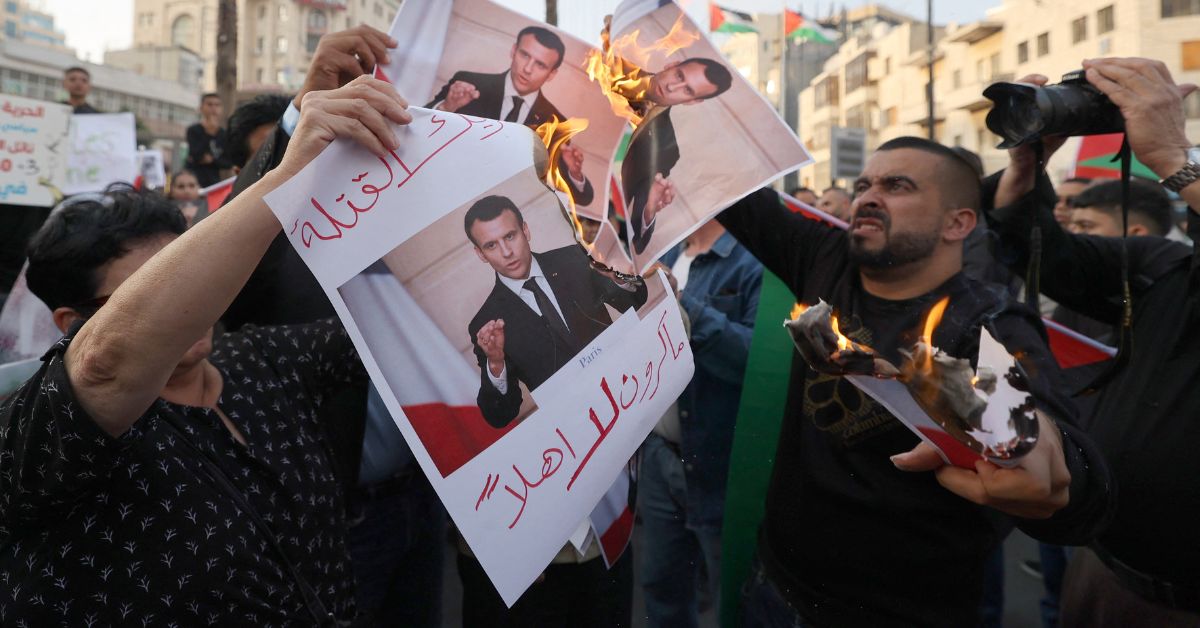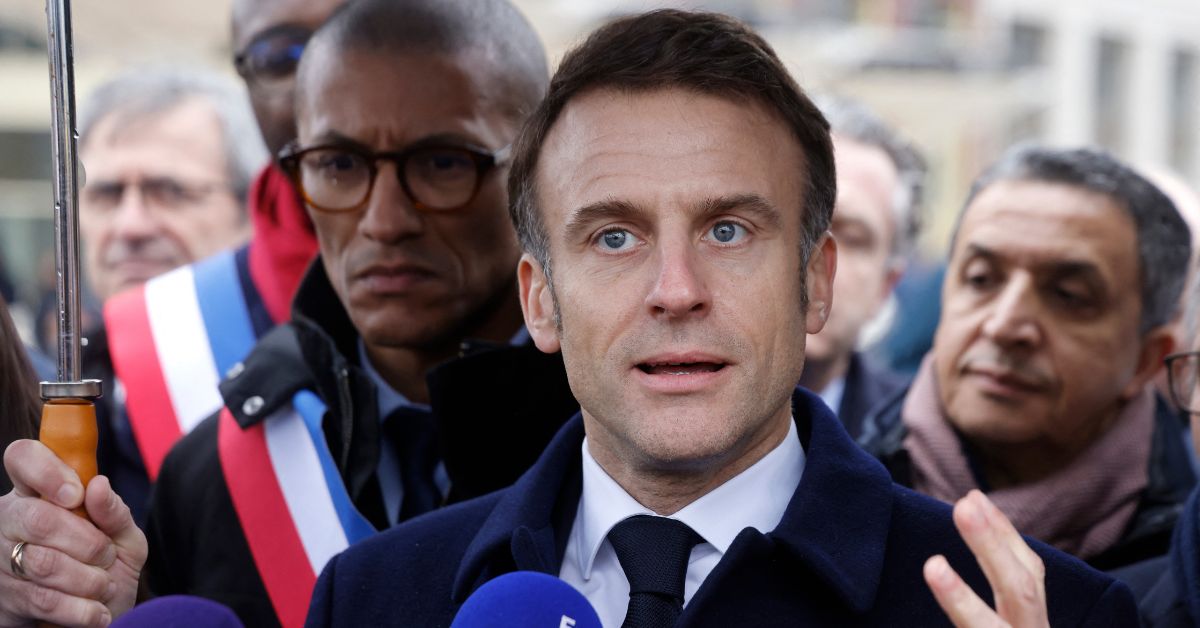PARIS — French President Emmanuel Macron is widely disliked around the world, a situation that should deeply concern France. At the same time, it appears that no amount of criticism can sway Macron’s actions or behavior.
Macron’s statements often go to extremes on various issues, yet he manages to avoid any political fallout. The French leader seldom seems capable of taking a principled stance on matters.
He has seen some transactional successes on international visits, leveraging France’s economic and military might, but his efforts appear more opportunistic than statesmanlike. During a trip to India in January, he secured several business and defense contracts for French firms.
One possible explanation for his actions and outspoken comments is Macron’s apparent love for aimless publicity. A recent instance is his proposal to send NATO troops to Ukraine amid the conflict with Russia.
At A Glance Global Unpopularity: French President Macron faces widespread criticism, unaffected by global or domestic dissent. Diplomatic Statements: His extreme remarks on NATO and Islam stir controversy but evade political consequences. Transactional Successes: Macron's international visits secure business, yet appear more opportunistic than diplomatic. NATO and Ukraine: Proposes sending NATO troops to Ukraine, contradicting previous criticisms of NATO as "brain dead." Electoral Pressures: With the Renaissance party's popularity waning against the National Rally, Macron adopts a hardline stance on Russia. Allegations of Corruption: Macron's tenure marred by reports of misconduct among key administration figures. Public Discontent: He faces direct assaults and widespread protests, highlighting deep-seated public dissatisfaction. Constitutional Term Limits: He expresses disdain for the two-term presidential limit amidst falling popularity.
“We are convinced that Russia’s defeat is crucial for security and stability in Europe,” Macron stated after a meeting with European leaders in Paris in February.
“There’s no consensus today to deploy troops on the ground in an official, sanctioned manner. However, in terms of dynamics, we cannot discount any possibilities,” he added.
This statement is particularly striking from someone who described NATO as “brain dead” in a November 2019 interview.
This is the same Macron who, before the escalation of hostilities in Ukraine in February 2022, advocated for integrating Russia into a new European security framework.
The reluctance of NATO to engage directly in the conflict with Russia, opting instead to provide Ukraine with financial, equipment, and training support, is evident in the Western response to Macron’s remarks.
Even the most aggressive NATO members, including the US, Britain, and Germany, who are as committed as France to preventing Russia’s success in the war, have clearly indicated their lack of interest in the kind of military involvement Macron seems to propose.
No member of the alliance would be reckless enough to risk “mutual assured destruction” (MAD), the deterrence doctrine that was effective during the Cold War and remains relevant, given the extensive nuclear arsenals of NATO and Russia.
Macron, whose “centrist” Renaissance party is losing ground to Marine Le Pen’s “far-right” National Rally, may be attempting to garner support with his hardline stance on Russia ahead of the European Parliament elections in June.
Le Pen accused Macron of acting like a “warlord.”
“But it’s our children’s lives he’s talking about so carelessly. The stakes are peace or war in our country,” she said.
Former French Foreign Minister Hubert Vedrine, a socialist, described Macron’s comment as “meaningless.”

Other ideas emanating from Macron are equally provocative, warlord-like, and meaningless.
He frequently offends Muslims in France and around the world with his thoughtless comments regarding Islam.
Despite the serious nature of Macron’s provocations, most Muslim countries have not taken practical political and economic actions against France.
Macron has also antagonized many in Turkey, including President Recep Tayyip Erdogan, who has not hesitated to respond directly to the French leader.
Erdogan sharply rebuked Macron’s NATO “brain dead” comment, advising the French president to “check whether you are brain dead.”
Erdogan again told Macron to get his “mental checks” when the French leader incited Muslim anger with his negative remarks about Islam in 2020.
“What is the problem of this person named Macron with Muslims and Islam?” Erdogan inquired.
The Turkish-French feud touches on both bilateral issues and the broader perception of France as an Islamophobic nation.
Macron’s stubborn support for cartoons of the Prophet Muhammad, while not exceptional by Western European standards, shows a disregard for the pitfalls of courting trouble with the Islamic world.
It’s well-known that the Muslim community and those of African heritage face discrimination and systematic racism in France. Thus, adversarial French attitudes towards Islam only exacerbate tensions.
The president of the Republic, Emmanuel Macron, believes he can do pretty much whatever he wants, and that represents an ethical, political, and institutional problem.
French MP Aurelien Pradie
In Africa, where memories of brutal colonial exploitation are still vivid, French dominance and involvement are resented even more.
Macron frequently makes inappropriate comments regarding Islam, sometimes proposing to “reform” it or labeling the religion as in “crisis,” leading to controversial remarks about issues involving Muslims.
Abuse and Corruption
Perhaps something in his personality leads him to see things differently from others.
Macron became involved with his drama teacher Brigitte Trogneux, who was 40, when he was just 15. They married in 2007. What seems perfectly normal to Macron is taboo and unusual for most, both due to the age gap and the crossing of a teacher-pupil boundary.
In the selection of Stephane Sejourne as France’s Foreign Minister, some perceive a mix of social and political intrigue. At 38, Sejourne is rumored to have been romantically involved with France’s openly homosexual and youngest-ever Prime Minister, Gabriel Attal, who is 34. The question arises: should their lifestyle or the potential for favoritism be the focus of scrutiny?
Since Emmanuel Macron, a former investment banker at Rothschild, assumed office in 2017, there have been numerous reports and allegations of misconduct involving key figures in his administration. These allegations have undermined Macron’s assertions of leading a transparent government and breaking away from the corruption and scandal that have marred French politics.
“The president of the Republic, Emmanuel Macron, believes he can do pretty much whatever he wants, and that represents an ethical, political, and institutional problem,” stated Aurelien Pradie, a member of the French parliament, in 2022.
Alexis Kohler, Macron’s Chief of Staff and a pivotal figure within the Elysee Palace, faced an investigation for alleged influence peddling and conflict of interest due to his connections with the Swiss–Italian shipping company Mediterranean Shipping Company (MSC).
Eric Dupond-Moretti, appointed Justice Minister in July 2020, was accused of conflict of interest and misuse of office. The allegations centered on whether he exploited his position to retaliate against magistrates and prosecutors with whom he had previously clashed as a renowned lawyer.

In November 2023, the Court of Justice of the Republic, a special tribunal for government officials, acquitted Dupond-Moretti, finding no criminal intent. However, the ordeal left him politically damaged.
Olivier Dussopt, Macron’s Labor Minister, faced trial over accusations of favoritism linked to the awarding of a water contract to a company during his tenure as mayor of Annonay in 2009. Dussopt, who took office in 2022, advocated for a contentious pension reform that increased the retirement age from 62 to 64, sparking widespread protests across France.
Nicolas Hulot, a former environment minister in Macron’s government, was accused by several women of rape and sexual assault. In 2018, Pascale Mitterrand, the granddaughter of former President Francois Mitterrand, confirmed she had filed a rape complaint against Hulot, a well-known environmental activist and TV presenter, in 2008.
Public dissatisfaction with Macron has been evident on numerous occasions, reflecting a broader discontent with his leadership and policies.
A man thwacked Macron across the face during a public appearance in southeastern France in June 2021. Later that same year, a student hurled an egg at him.
In April 2022, Macron narrowly avoided being struck by cherry tomatoes thrown by a protester.
The resentment toward him is increasingly targeting the French state itself. In June 2023, simmering discontent exploded into large-scale protests and violence following the police shooting of a 17-year-old during a traffic stop in a Paris suburb. Article 435-1 of the internal security code, enacted in 2017, allows police officers to use their firearms if they determine a suspect is failing to comply. Critics view this as a state-sanctioned license to kill.
Macron is perceived as detached and prone to making grand but empty promises.
He faced widespread criticism after a two-hour press conference in January, where he discussed his objectives for the rest of his term.
“Macron avoided all the topics that matter to the French: soaring electricity costs, the environmental crisis, housing, and job insecurity,” said Marine Tondelier, a representative of the Green party EELV.
Re-elected in 2022, Macron dislikes the idea of leaving office in 2027, as the constitution prohibits more than two presidential terms. He has referred to the term limit as “damnable nonsense.” However, his dwindling popularity suggests that his difficulties for the remainder of his presidency will only grow.








